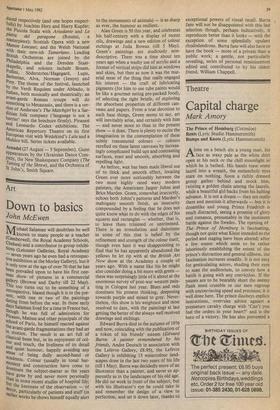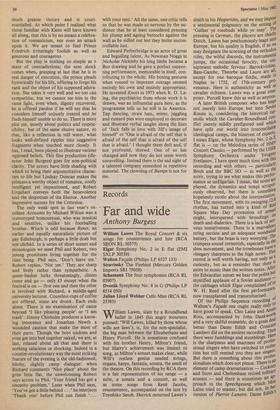Theatre
Capital charge
Mark Amory
The Prince of Homburg (Cottesloe) Rents (Lyric Studio Hammersmith) Bumps and Knots (Lyric Hammersmith) Aone on a bench sits a young man, his face as waxy pale as the white shirt open at his neck or the chill moonlight in which he is bathed. His hands tease some laurel into a wreath, the melancholy eyes stare on nothing. Soon a richly dressed group gather behind and mock him, twisting a golden chain among the laurels, while a beautiful girl backs from his halting advance. It is not a dream — they are really there and mention it afterwards — but it is dreamlike and young Prince Friedrich is much distracted, seeing a promise of glory and romance, presumably in the imminent battle against the Swedes. The opening of The Prince of Homburg is fascinating, though not quite what Kleist intended as the period and staging have been altered; after a few scenes which seem to be rather laboriously establishing the extent of the prince's distraction and general silliness, the fascination increases steadily. It is not easy for gesticulating actors, shading their eyes to scan the auditorium, to convey how a battle is going with any conviction. If the pauses are to be bearably short the enemy flank must crumble or our men regroup with unconvincing speed and precision; it is well done here. The prince disobeys explicit instructions, overrules advice against a premature cavalry charge with 'Can't you feel the orders in your heart?' and is the hero of a victory. He has also prevented a
much greater victory and is court- martialled. At which point I realised what those familiar with Kleist will have known all along, that this is by no means a celebra- tion of romanticism, nor even an attack upon it. We are meant to find Prince Friedrich irritatingly foolish as well as generous and courageous But the play is nothing so simple as a mass of contradictions; the next shock comes when, grasping at last that he is in real danger of execution, the prince pleads hysterically for his life, offering to forgo his rank and the object of his supposed adora- tion. She takes it very well and we too can sympathise, but we cannot see him in the same light, even when, dignity recovered, he is offered pardon if he will say that he considers himself unjustly treated and he finds himself unable to do so. There is more plot yet, mostly about politics and respon- sibility, but of the same elusive nature, so that, like a reflection in still water, what looks well-defined ripples into suggestive fragments when touched more closely. It has, I read, been played to illustrate various opposed beliefs. This fine production (dir- ector John Burgess) goes for non-political clarity. The actors have little shading with which to bring their argumentative charac- ters to life but Lindsay Duncan makes the princess a worthy object of romance, coolly intelligent yet impassioned, and Robert Urquhart conveys both the benevolence and the despotism of the Elector. Another impressive success for the Cottesloe.
The only weak spot in last year's ex- cellent Accounts by Michael Wilcox was a stereotyped homosexual, who was musical and sensitive, unlike his footballing brother. Which is odd because Rents, an earlier and equally naturalistic picture of gay Edinburgh, is perhaps a little drab but not cliched. In a series of short scenes and monologues we meet Phil and Robert, two young prostitutes living together for the time being. Phil says, 'Don't leave me.' Robert replies, 'Not yet.' They are sharp and lively rather than sympathetic. A queer-basher lurks threateningly, clients come and go — only £5 except when the festival is on — first one and then the other is involved with Richard, a middle-aged university lecturer. Countless cups of coffee are offered, some are drunk. Each ends alone. There is no examination of cause beyond 'I like pleasing people' or 'I am trash'. Jimmy Chisholm produces a know- ing innocence and Jonathan Newth a wounded caution that make the most of their parts. Though the boys undress and even get into bed together naked, we are, at last, relaxed about all that and there is nothing salacious or shocking. Indeed in a counter-revolutionary way the most striking feature of the evening is the old-fashioned, bitchy, slightly camp dialogue: when Richard comments 'Nice place' about the grim little flat, the unwelcoming Robert says across to Phil, 'Your friend has got a sincerity problem.' Later when Phil says, 'You've got a little behind ...' he interjects 'Thank you' before Phil can finish
with your rent.' All the same, one critic tells us that he was made so nervous by the au- dience that he at least considered pressing his plump and ageing buttocks against the wall as he sidled out lest they incite uncon- trollable lust.
Edward Petherbridge is an actor of great and beguiling talent. As Newman Noggs in Nicholas Nickleby his long limbs became a Boz drawing and he gave a perfect suppor- ting performance, memorable in itself, con- tributing to the whole. His boxing gestures when roused to impotent outrage seemed entirely his own and entirely appropriate. He invented Knots in 1973 when R. D. La- ing, the psychiatrist from whose work it is drawn, was an influential guru here, as the programme tells us he still is in America. Tap dancing, straw hats, mime, juggling and custard pies were employed to decorate and illustrate verbal tangles along the lines of 'Jack falls in love with Jill's image of himself' or 'One is afraid of the self that is afraid of the self that is afraid of the self that is afraid.' I thought them deft and, if not profound, shrewd. One of us has changed and now they do not seem worth unravelling. Instead there is the sad sight of a talented company enmeshed in repetitive material. The clowning of Bumps is not for me.







































 Previous page
Previous page